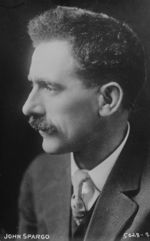John Spargo
John Spargo (January 31, 1876–August 17, 1966), was a journalist and prominent Socialist in the Progressive Era. Spargo moved right and by 1917 became a leading anti-Communist
His The Bitter Cry of the Children (1906) was a classic Muckraking expose of harsh conditions of child labor in Maine. He started as socialist in Britain, but spent most of his life in the United States, After 1910 he moved steadily to the right of the American Socialist movement, advocating a gradualist and anti-revolutionary interpretation of Marxism.
Early life
He was born on January 31, 1876 in Stithians, Cornwall, England, to Thomas and Jane Hocking Spargo.[1]
Political viewpoints
By 1916 Spargo advocated American intervention in the World War, and was an early and penetrating critic of the Bolshevik Revolution in Russia in 1917. Spargo composed the "Colby Note" of 1920 that formalized President Woodrow Wilson's anti-communist doctrine. In 1917-21 he led the Social Democratic League of America (SDL), along with William English Walling.
In the 1920's, he endorsed Calvin Coolidge, and was an advisor to President Herbert Hoover.[2][3]
Spargo became less and less liberal until he was shocked by Franklin D. Roosevelt's New Deal and its recognition of the Soviet Union in 1933. He spoke out in support of the Dies Committee on Un-American Activities in the late 1930s as it exposed Communists and Fascists inside the U.S. Spargo energetically supported Joe McCarthy and Richard Nixon, as well as Barry Goldwater in the 1964 elections.
Ruotsila (2006) sees Spargo's odyssey as a logical and linear progression in which he successfully preserved the core of his Social Gospel even as he became a Republican activist.
Further reading
- Radosh, Ronald. "John Spargo and Wilson's Russian Policy, 1920," Journal of American History 1965 52(3): 548-565, in JSTOR
- Ruotsila, Markku. John Spargo and American Socialism (2006)
